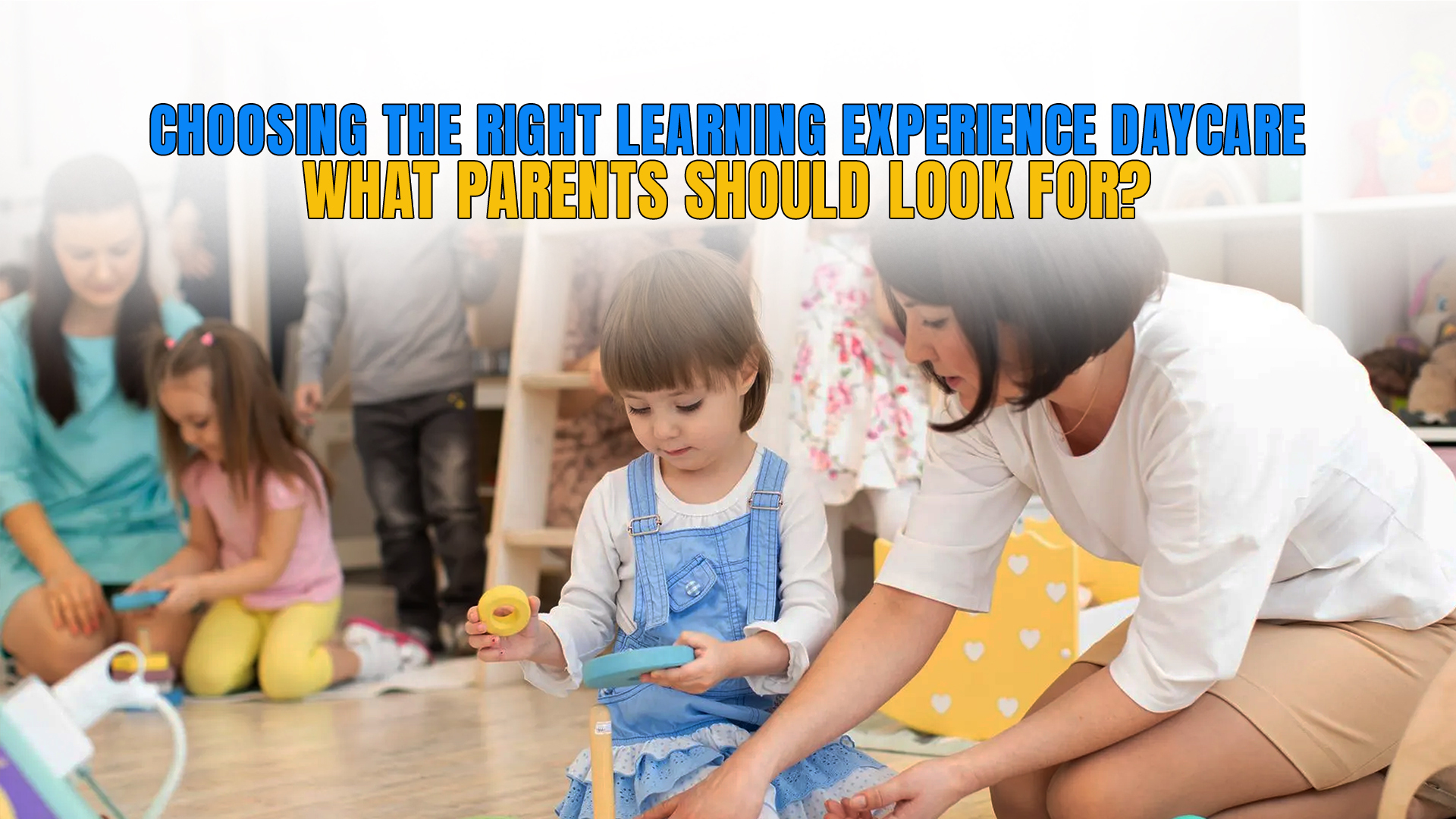Every parent wants the best for their children!
When it comes to early childhood education, parents are often non-compromising on the quality of education and care. Choosing the right daycare is an important decision for parents, as it lays the foundation for a child’s early development and well-being. A high-quality daycare is significant for ensuring your little one’s safety. It also promotes growth, learning, and socialization in a safe and nurturing environment. Here are the 8 most essential factors you should consider as a parent when selecting the ideal high-quality learning experience daycare for your little ones.
- Licensing and Accreditation:
Ensuring that a daycare center holds proper licensing and accreditation is fundamental. A licensed daycare facility confirms that it meets state-mandated health and safety standards, while accreditation from recognized organizations indicates a commitment to exceeding basic requirements. Accredited centers often implement advanced curricula and maintain higher staff qualifications, which provides a richer learning environment for children.
You should always verify the center’s credentials by consulting state regulatory agencies or trusted directories. This due diligence offers peace of mind, knowing that the daycare adheres to established guidelines and is regularly inspected for compliance.
- Staff Qualifications and Ratios:
The quality of caregivers significantly impacts a child’s learning experience in daycare. Educators with relevant qualifications and training in early childhood education are better equipped to support developmental milestones and address individual needs. Additionally, low child-to-staff ratios ensure personalized attention that promotes a secure and engaging environment. When visiting potential daycares, you should inquire about staff credentials and the child development center’s commitment to ongoing professional development. Observing interactions between staff and children can provide insights into the caregivers’ dedication and the overall atmosphere of the facility. Prioritizing centers with qualified staff and favorable ratios promotes a positive and enriching experience for children.
- Safety and Cleanliness:
A safe and clean environment is paramount in any daycare setting. As a parent looking for a high-quality daycare center, you must make sure that the facilities have secure entrances and childproofed spaces. They adhere to strict hygiene practices to prevent illness and accidents. Regular cleaning schedules and clear protocols for emergencies reflect a center’s commitment to children’s well-being.
You can assess safety and cleanliness by touring the facility, and noting the condition of play areas, restrooms, and dining spaces. Inquiring about the center’s policies on illness, sanitation, and emergency preparedness provides additional assurance.
- Curriculum and Learning Approach:
The educational philosophy and curriculum of a daycare influence a child’s cognitive and social development. Programs that balance structured activities with free play encourage exploration, creativity, and critical thinking paired with an amazing learning experience in daycare. A well-rounded curriculum addresses various developmental domains, including language, motor skills, and social-emotional growth.
It is recommended to seek information about the center’s daily schedules, learning objectives, and how they personalize activities to different age groups. Observing a class in a session can provide a glimpse into the learning environment and teaching methods.
- Policies For Communication and Parental Involvement:
Open and transparent communication between parents and caregivers is highly essential for a child’s success and a wonderful learning experience in daycare. Regular updates on progress, behavior, and daily activities keep parents informed and involved. Centers that encourage parental participation through events, conferences, or volunteer opportunities build a strong community and reinforce the child’s support system.
When evaluating daycares, as a parent you should inquire about communication channels, frequency of updates, and opportunities for involvement. A center that values and facilitates parental engagement demonstrates a collaborative approach to childcare, benefiting the child’s development and family satisfaction.
- Location and Convenience:
The daycare’s location plays a significant role in daily logistics and work-life balance. A facility close to home or work reduces commute times and offers flexibility in drop-off and pick-up routines. Additionally, proximity can be an important factor during emergencies or when unexpected situations arise.
- Cost and Financial Policies:
Understanding the financial commitment and policies of a daycare is essential for long-term planning. Costs can vary widely based on services offered, location, and the center’s reputation. It’s important to assess what the fees include, such as meals, extracurricular activities, or supplies, to avoid unexpected expenses.
Parents should also inquire about payment schedules, late fees, and policies regarding vacations or absences. Some centers may offer financial assistance or sliding scale fees based on income. By thoroughly understanding the financial aspects, parents can ensure that the chosen daycare aligns with their budget and expectations.
- Flexibility and Hours of Operation:
The daycare’s operating hours should align with the family’s schedule and accommodate any specific needs. Flexible hours, options for part-time care, or extended services can be crucial for parents with unconventional work schedules.
Understanding the center’s policies on holidays, inclement weather closures, and backup care options is also important. A daycare that offers flexibility demonstrates an understanding of diverse family dynamics and supports parents in balancing work and personal responsibilities.
Final Thoughts
In conclusion, selecting the right daycare involves careful consideration of various factors that contribute to a child’s safety, learning, and overall well-being. Parents should prioritize a facility that aligns with their values, meets high-quality standards, and fosters a nurturing environment. A daycare that provides qualified staff, a structured yet flexible curriculum, open communication, and a safe setting ensures that children thrive both emotionally and intellectually.
Taking the time to research, visit multiple centers, and ask detailed questions allows parents to make an informed decision. Trusting instincts, seeking recommendations, and observing how caregivers interact with children can provide valuable insights. Ultimately, the right daycare is one that not only provides a secure and stimulating space but also supports parents in their journey of raising happy, confident, and well-rounded children.







